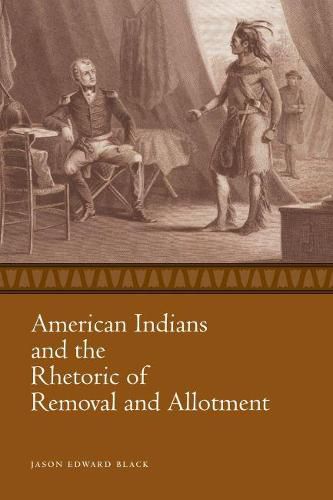American Indians and the Rhetoric of Removal and Allotment
Jason Edward Black

American Indians and the Rhetoric of Removal and Allotment
Jason Edward Black
This title is printed to order. This book may have been self-published. If so, we cannot guarantee the quality of the content. In the main most books will have gone through the editing process however some may not. We therefore suggest that you be aware of this before ordering this book. If in doubt check either the author or publisher’s details as we are unable to accept any returns unless they are faulty. Please contact us if you have any questions.
Jason Edward Black examines the ways the US government’s rhetoric and American Indian responses contributed to the policies of Native-US relations throughout the nineteenth century’s removal and allotment eras. Black shows how these discourses together constructed the perception of the US government and of American Indian communities. Such interactions–though certainly not equal–illustrated the hybrid nature of Native-US rhetoric in the nineteenth century. Both governmental, colonizing discourse and indigenous, decolonizing discourse shaped arguments, constructions of identity, and rhetoric in the colonial relationship.
American Indians and the Rhetoric of Removal and Allotment demonstrates how American Indians decolonized dominant rhetoric through impeding removal and allotment policies. By turning around the US government’s narrative and inventing their own tactics, American Indian communities helped restyle their own identities as well as the government’s. During the first third of the twentieth century, American Indians lobbied for the successful passage of the Indian Citizenship Act of 1924 and the Indian New Deal of 1934, changing the relationship once again.
In the end, Native communities were granted increased rhetorical power through decolonization, though the US government retained an undeniable colonial influence through its territorial management of Natives. The Indian Citizenship Act and the Indian New Deal–as the conclusion of this book indicates–are emblematic of the prevalence of the duality of US citizenship that fused American Indians to the nation, yet segregated them on reservations. This duality of inclusion and exclusion grew incrementally and persists now, as a lasting effect of nineteenth-century Native-US rhetorical relations.
This item is not currently in-stock. It can be ordered online and is expected to ship in 7-14 days
Our stock data is updated periodically, and availability may change throughout the day for in-demand items. Please call the relevant shop for the most current stock information. Prices are subject to change without notice.
Sign in or become a Readings Member to add this title to a wishlist.


